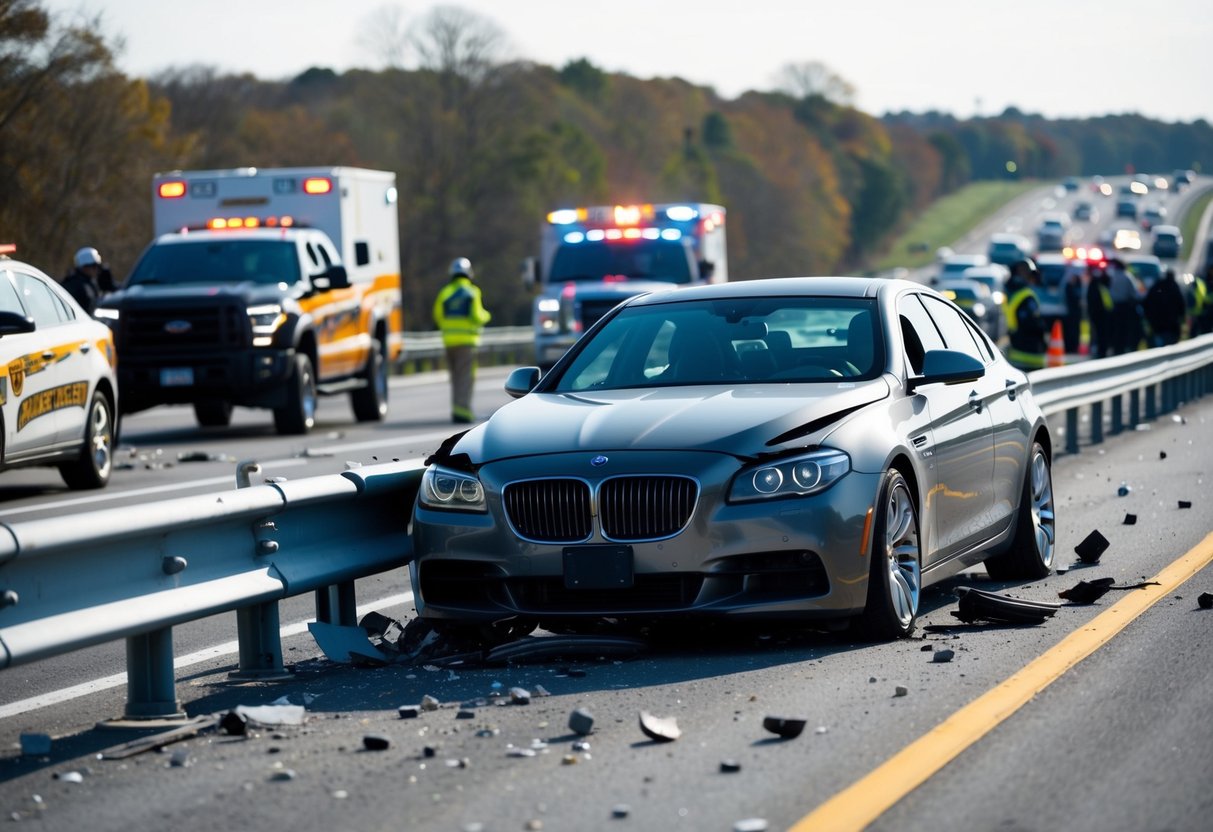
What Happens When a High-Value Vehicle Is Involved in a Car Accident in New Jersey?
Navigating the aftermath of an accident involving a high-value vehicle in New Jersey can be complex. When a high-value vehicle is involved in a car accident, the first step is to assess the situation for any injuries and report the incident as required by New Jersey law. This includes contacting emergency services immediately if there are injuries or significant damage.
Once safety is ensured, attention must shift to the value of the vehicle and the insurance implications. Diminished value claims allow owners to recover the difference between the vehicle’s pre-accident value and its post-repair value. Owners should contact the at-fault party’s insurance to request compensation for the diminished value.
Handling high-value vehicles necessitates understanding specific insurance coverages, including liability limits and recovery options. High-value claims often involve more extensive paperwork and negotiation, making it critical for owners to be well-informed and diligent in their follow-up actions to secure proper compensation.
Legal Framework for High-Value Vehicle Accidents in New Jersey
In New Jersey, high-value vehicle accidents involve specific legal considerations like fault determination, the state’s no-fault insurance system, and comparative negligence rules. These elements are crucial for anyone dealing with the aftermath of an accident involving vehicles with significant monetary worth.
Determining Fault and Liability
Fault determination is pivotal in New Jersey car accidents. The state employs a modified comparative negligence rule, meaning that the involved parties’ degree of fault will affect the compensation they receive.
For high-value vehicles, the stakes are higher, making it essential to gather comprehensive evidence—photos, witness statements, and police reports. Consulting a car accident lawyer in Bergen County, NJ can provide expertise in fault assessment. This is especially important when high repair costs are involved.
New Jersey’s No-Fault Insurance System
New Jersey operates under a no-fault insurance system. This mandates that each driver’s insurance covers their medical expenses, regardless of who caused the accident. The Personal Injury Protection (PIP) in New Jersey covers up to $250,000 for medical expenses.
However, for high-value vehicles, damages often exceed typical coverage limits. Thus, additional policies like comprehensive and collision insurance are advisable. These provide broader protection and can compensate for high repair costs, allowing owners of high-value vehicles to recover without significant financial loss.
Role of Comparative Negligence
Comparative negligence in New Jersey allows claimants to recover damages even if they are partially at fault, as long as their fault is less than 50%. The recovered amount is adjusted based on the claimant’s degree of fault.
For instance, if a driver is 20% at fault in an accident involving a high-value vehicle, they can recover 80% of the damages. Legal help from a car accident lawyer in Bergen County, NJ ensures the claimant receives a fair settlement considering their degree of fault and the significant value of the vehicle involved.
Insurance Claims and High-Value Vehicles
High-value vehicles require special attention when filing insurance claims due to their significant worth and unique repair needs. Addressing these concerns involves understanding specific procedures, resolving valuation challenges, and negotiating effectively with insurance companies.
Filing Insurance Claims for High-Value Vehicles
When a high-value vehicle is involved in a car accident, filing an insurance claim requires meticulous documentation. Owners should immediately report the incident to their insurer and gather detailed evidence, including photos, repair estimates, and witness statements. It is essential to use reputable sources like Kelley Blue Book to determine the vehicle’s fair market value.
Hiring a car accident lawyer in Bergen County, NJ, can be particularly beneficial. Legal professionals can navigate the complexities of high-value claims and help ensure all necessary steps are followed correctly, increasing the chances of a favorable outcome.
Challenges in Valuing High-Value Vehicle Damages
Valuing damages for high-value vehicles is complex due to their bespoke parts and higher repair costs. Insurance companies may undervalue these vehicles, considering them on par with standard cars. Disputes often arise regarding the extent of the damage and the cost of repairs, especially if specialized labor or rare parts are required.
Owners should prepare by obtaining multiple repair estimates from certified shops familiar with their vehicle’s make and model. This data can provide a robust counter to insurer assessments and prove the true extent of necessary repairs.
Negotiating With Insurance Companies
Negotiating with insurance companies for high-value vehicle claims involves clear, evidence-backed communication. Policyholders should be prepared to counter low settlement offers with documented valuations and repair estimates. Using detailed records can substantiate the vehicle’s pre-accident condition and post-accident diminished value.
A car accident lawyer in Bergen County, NJ, can also assist in these negotiations. Their expertise can help interpret policy language, challenge unfair assessments, and push for a settlement that accurately reflects the vehicle’s worth and repair needs. Engaging professional legal assistance can significantly impact the negotiation process, often yielding better compensation outcomes.
Litigation Strategies for High-Value Car Accident Cases
When dealing with high-value car accident cases, it’s crucial to understand when to escalate matters to a lawsuit, how to handle evidence collection and expert testimony, and the methods for calculating appropriate damages and compensation.
When to File a Lawsuit
Timing is key when deciding whether to file a lawsuit. If initial settlement negotiations fail to produce a fair offer, involving a car accident lawyer in Bergen County, NJ, can be beneficial. Lawyers have the expertise to evaluate the case’s worth, considering factors such as vehicle damage, medical bills, and lost wages.
Knowing the statute of limitations for New Jersey is essential. Typically, you have two years from the date of the accident to file a personal injury lawsuit. Filing promptly avoids complications that might arise due to delays in getting the case before a judge.
Evidence and Expert Testimony
The strength of high-value car accident cases often depends on the quality of evidence and the use of expert testimony. Collecting comprehensive photographic evidence, along with police reports and medical records, is essential.
Expert witnesses, such as accident reconstruction specialists, can provide technical perspectives that bolster your case. Medical experts offer critical insights into the long-term impact of injuries, enhancing claims for higher compensation. These testimonies help present a compelling and factual narrative to the court.
Calculating Damages and Compensation
Accurately calculating damages in high-value car accident cases involves a detailed analysis. Compensation typically includes economic damages like medical bills and vehicle repair costs, as well as non-economic damages for pain and suffering. Consulting resources like this article on typical settlement amounts can provide a benchmark.
For high-value vehicles and significant injuries, damages might also account for diminished earning capacity if the victim is unable to return to their prior employment. An experienced attorney can quantify these aspects to ensure a fair and comprehensive claim is presented.
The post What Happens When a High-Value Vehicle Is Involved in a Car Accident in New Jersey? appeared first on My Car Heaven.

